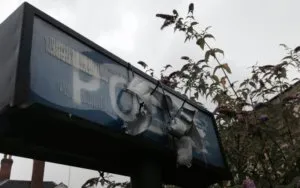The number of disability hate crimes recorded by the police rose by more than 50 per cent last year, according to new figures released by the Home Office.
The rise in recorded disability hate crimes (53 per cent) was larger than for any other strand, with race hate crimes rising by more than a quarter (27 per cent), those motivated by sexual orientation also increasing by 27 per cent, and religion-based hate crime rising by 35 per cent.
In all, the number of hate crime offences recorded by police in England and Wales rose by 29 per cent to more than 80,000 between 2015-16 and 2016-17.
The increase in disability hate crimes was even bigger than the rise of more than 40 per cent last year, which again had been a larger rise than for any other hate crime strand.
Despite the new Home Office figures, it is still not clear whether there has been an increase in actual disability hate crimes in recent years, if the increase is due to a rise in reporting of hate crimes, or if it is due to a combination of both factors.
Since 2011-12, the number of disability hate crimes recorded by police has risen from 1,748 to 5,558.
The Home Office report says that some of the rise in race and religious hate crime was due to a genuine increase in hate crime, particularly around the time of the EU referendum in June 2016 and the terrorist attacks in London and Manchester this year.
But the report says that a second consecutive year of sharp rises in disability, sexual orientation and transgender hate crime (which rose by 45 per cent this year) is probably due to the police “improving their identification and recording of hate crime offences and more people coming forward to report these crimes rather than a genuine increase”.
Nearly nine in 10 offences (89 per cent) flagged as hate crimes in 2016-17 were either public order offences or “violence against the person”.
Meanwhile, figures released by the Crown Prosecution Service (CPS) show that the number of disability hate crime prosecutions rose from 941 in 2015-16 to 1,009 in 2016-17, an increase of more than seven per cent.
The proportion of successful convictions also increased, from 75.1 per cent to 77.3 per cent, with the number rising from 707 to 800 in 2016-17.
Despite these numbers, only 117 cases saw a recorded and announced increase in a sentence on the grounds of disability hate crime, although this was an increase from 84 in 2015-16.
The report says that the number of sentence uplifts “remains considerably lower than that for other hate crime strands”.
In the 10 years since 2007–08, this has risen from four sentence uplifts (2.8 per cent of successful prosecutions) to 117 (14.6 per cent).
But it compares with more than half of all cases (52.2 per cent) involving hostility on the grounds of race, religion, sexual orientation, disability or transgender identity which saw sentences “uplifted”.
Stephen Brookes (pictured), a coordinator of the Disability Hate Crime Network, wrote to solicitor general Robert Buckland in August to warn him that “alarm bells are ringing” over the “massive discrepancies and inconsistencies” in the way the criminal justice system dealt with disability hate crime (DHC) prosecutions.
He said then that he and his colleagues felt “deep dismay” that six recent court cases involving violent attacks on disabled people – reported by Disability News Service (DNS) – had not been treated as disability hate crimes.
In the letter, he wrote: “Once again we see that it seems to be difficult to prove an offence is a disability hate crime under current legislation especially if the case is not supported by absolute DHC based evidence.
“Additionally we still find that cases in which CPS treated the offences as disability hate crime, the judiciary still frequently refuse to accept their responsibility and increase the sentence, proving that there are massive issues in the way both police and the judiciary [deal with] disability hate crimes.”
He said that Buckland had agreed in his response that there were “considerable challenges in showing there is aggravation in relation to disability in serious offences”, and that more work needed to be done by the criminal justice system.
Brookes said this week: “My concern has to be that we still are finding major barriers in the whole DHC charging process as proving disability hostility is still too vague in some respects.”
Alison Saunders, director of public prosecutions, said: “Crimes motivated by hate have a corrosive effect on society and it is pleasing to see the courts are using their powers to increase sentences in the majority of cases for the first time.
“Sentence uplifts are important because they demonstrate that the CPS has built the case effectively, the hate crime element has been recognised and the perpetrator has received a more severe sentence as a result.”
In all, across race, religion, homophobic, biphobic, transphobic and disability hate crimes, there were 14,480 convictions in 2016-17, with a success rate for the CPS of 83.4 per cent.

 Ministers are considering further extension to disability hate crime laws, after pledge on ‘aggravated’ offences
Ministers are considering further extension to disability hate crime laws, after pledge on ‘aggravated’ offences Labour’s ‘watered-down’ response to Grenfell evacuation proposal ‘was a betrayal’
Labour’s ‘watered-down’ response to Grenfell evacuation proposal ‘was a betrayal’ Abuse of disabled supporters at live sports events is growing problem, survey finds
Abuse of disabled supporters at live sports events is growing problem, survey finds